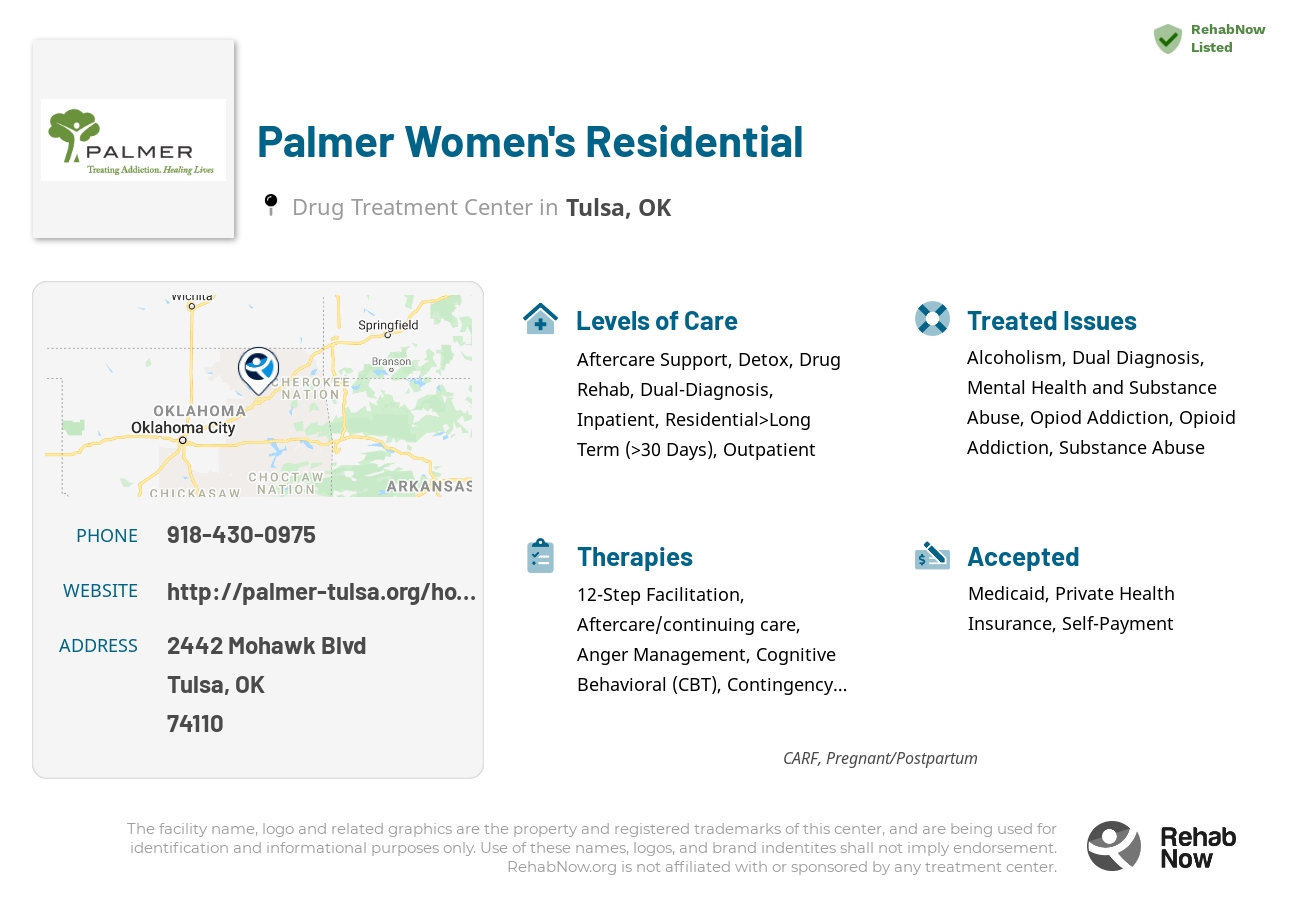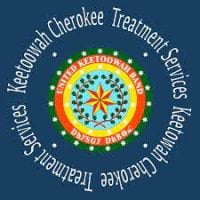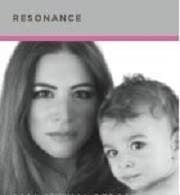Palmer Women's Residential
Drug Rehab Center in Tulsa, Oklahoma
Palmer Women's Residential is a CARF accredited addiction treatment facility in Tulsa, OK founded in 1971 that provides evidence-based therapies and recovery strategies to help individuals achieve and sustain sobriety with levels of care ranging from detox to aftercare, accepting private health insurance and providing long-term follow up assistance.
About This Tulsa, OK Facility
Tulsa Women and Children's Center offers compassionate treatment for substance abuse and addiction in Tulsa, Oklahoma. This residential facility focuses on promoting sustained recovery for pregnant or parenting women and their families.
- One of the few programs nationwide accommodating children while mothers receive residential care
- Specialized services tailored for pregnant and parenting women
- Family-oriented approach supporting mothers and their children
- Comprehensive treatment promoting long-term sobriety
Accredited by CARF, Tulsa Women and Children's Center upholds the highest standards of quality care. Their mission emphasizes providing compassionate treatment to help women and families achieve lasting recovery.
The center treats addictions to alcohol, opioids, and other substances. Treatment methods include detoxification, residential care, and outpatient services tailored to each individual's needs. Various levels of care are available to support recovery journeys.
Genders
Ages
Modality
Additional
Accreditations

CARF
The Commission on Accreditation of Rehabilitation Facilities (CARF) is a non-profit organization that specifically accredits rehab organizations. Founded in 1966, CARF's, mission is to help service providers like rehab facilities maintain high standards of care.
Conditions and Issues Treated
Substance abuse is the excessive use of any type of drug. This includes alcohol, medications and illegal drugs. Substance abuse is treated with a combination of physical and mental treatments. Palmer Women's Residential patients detox and follow up with therapies that target the underlying cause of the addiction.
Opioid addiction is one of Oklahoma‘s most prominent forms of addiction. Drugs, including heroin, oxycontin, and fentanyl, are the most common. To relieve pain, or ease other ailments, they are professionally prescribed, but they are often abused because they and the feelings they give are addictive.
Addiction is treated by detoxifying the body, so the medications’ chemicals are no longer impacting the individual. Palmer Women's Residential offers therapies to correct behavior and target the root of the problem are supplemented during and throughout treatment.
Some of the most common co-occurring disorders are schizophrenia, depression, and bipolar disorder. Most rehab facilities in Tulsa, OK like Palmer Women's Residential provide patients with a dual diagnosis. Dual diagnosis gives rehab the means to treat addiction while restoring mental and emotional health.
Levels of Care Offered
This center offers a variety of custom treatment tailored to individual recovery. Currently available are Aftercare Support, Detox, Drug Rehab, Dual-Diagnosis, Inpatient, Outpatient, Residential, with additional therapies available as listed below.
Detox treatment begins when the patient leaves their surroundings of family and friends, which is usually when they are most vulnerable. Being in a safe environment surrounded by medical professionals provides them with the safety net many of them need to get over their addiction. With kind and caring staff members, patients can feel relaxed, and they will need to start by admitting that they have a problem in order to get better.
If a person goes through detox treatment, they will understand their addiction better, and they won’t want to relapse and lose all the benefits of sobriety. They can see the effects of using drugs and how it makes them feel, which will make them want to quit their addiction.
Drug detox is vital to the recovery process, and it ensures that a patient will be in a safe environment during their withdrawal.
An inpatient is a person who stays in a hospital or rehab center during treatment. For alcohol- and drug-dependent individuals, inpatient rehabs provide individualized around-the-clock services. Inpatient treatment programs address a person’s unique physical, medical, and psychological needs. A team of experts assess the severity of the addiction and design a highly tailored program. typically, the length of stay in an inpatient facility in Tulsa, OK is 30 days. Those with severe addiction may need to stay at the facility for 60 to 90 days.
Outpatient rehabilitation is a treatment that exists if a patient is not checking into Palmer Women's Residential long term. In addition to helping them recover, the patient attends regular therapy sessions and detox and participates in other therapies. However, this is all primarily done from home. As a follow-up to inpatient treatment, outpatient treatment is usually recommended.
After rehabilitation, it helps people return to their everyday lives. It may also be an alternative to inpatient care in some situations. If they cannot leave their jobs, children, or don’t have the money for inpatient care, people can choose this method. Inpatient therapy, however, is the best method and most suggested level of treatment offered by Palmer Women's Residential in recovering from addiction.
Residential treatment programs are those that offer housing and meals in addition to substance abuse treatment. Rehab facilities that offer residential treatment allow patients to focus solely on recovery, in an environment totally separate from their lives. Some rehab centers specialize in short-term residential treatment (a few days to a week or two), while others solely provide treatment on a long-term basis (several weeks to months). Some offer both, and tailor treatment to the patient’s individual requirements.
Palmer Women's Residential‘s Therapies & Programs
Customized individual therapy is counseling involving you and your counselor at Palmer Women's Residential. This builds a personal and trusting relationship so you can truly be yourself and express any emotions as you feel them. Individual therapy leads to greater peace and understanding about your triggers for addiction and coping strategies to prevent relapse.
Substance abuse does a number on an individual’s relationship with other people, particularly in marriage. Spousal relationships bear the brunt of alcohol and drug dependence. Therefore, it becomes critical to submit the relationship to couples therapy to prevent straining it further. Most programs only zero in on the individual with substance addiction without factoring in the importance of the other half’s emotional support.
However, some facilities, like Palmer Women's Residential in Tulsa, Oklahoma, offer couples therapy options to manage intimate partnerships amid the recovery process. Other couples-focused treatment plans can provide the patient and their partner tools to get things back to normal, support each other, and the patient’s sobriety.Group Therapy is a type of counseling that occurs between a bunch of strangers. These groups are suitable for patients who are not confined in a treatment facility, but group sessions are also common in inpatient rehab programs. Group therapy is led by a trained individual at Palmer Women's Residential in Tulsa, OK and consists of members from different stages of recovery.
The goal of group therapy sessions is to foster hope and a sense of belonging, share information, and learn coping mechanisms. It also helps to have people who can relate to what you’re going through. Good behaviors can also be contagious, and participants can learn from one another.
Unresolved trauma is often a key reason why many patients resorted to substance abuse. Trauma could be physical abuse, sexual abuse, war, natural disasters, divorce, accident, loss of a loved one, etc. If trauma is the primary cause of substance abuse, then both issues must be addressed.
Dialectical Behavior Therapy (DBT) is an improved version of Cognitive Behavioral Therapy (CBT) DBT is a treatment of choice for people being treated at Palmer Women's Residential whom are suffering from self-harming behaviors. Conditions such as obsessive-compulsive disorder and borderline personality disorder also benefit from DBT.
Cognitive Behavioral Therapy (CBT) is an approach and method in psychotherapy. Palmer Women's Residential asks people to investigate how their thoughts, including habitual, negative, and inaccurate ways of thinking affect behaviors. CBT is based on the idea that rigid, inflexible ways of thinking cause people to have a limited ability to cope with stress
Rational Emotional Behavior Therapy (REBT) is a method of specific counseling that replaces negative and self-limiting thoughts with positive and productive behaviors. Self-defeating thoughts and habits can limit your possible successes. Some examples of this are procrastination, unhealthy eating and angry outbursts. You may not be aware that some unhealthy behaviors and thoughts are sabotaging your potential accomplishments.
The 12-step program is a part of substance abuse treatment offered at Palmer Women's Residential. It was initially developed by the founders of Alcoholics anonymous. The program provides the benefit of cognitive restructuring. It refers to the process of change in the negative thoughts that leads to long-term benefits.
Nutrition therapy, which is also known as Medical nutrition therapy (MNT) involves providing healthy diet and improving the eating habits of the patient. Expert dieticians provide individualized meal plan, that addresses the specific nutritional deficiencies and the nutritional impact associated with the medicines that are given as a part of the treatment. It helps to overcome the food cravings that are seen in certain addictions and also addresses the co-occurring conditions such as eating disorders.
Nutrition therapy is very important to support the different therapies provided as a part of comprehensive care. Nutrition therapy also teaches the associated life skills such as cooking healthy food and grocery shopping.
Nicotine replacement is a way to move towards stopping smoking or using any form of nicotine. This can be nicotine gum or nicotine patches. The process of working with trained staff at Palmer Women's Residential in setting a goal quit date, using nicotine replacement and gradually decreasing nicotine intake is proven to help.
Some people refer to contingency management, or CM, as motivational incentives. This type of therapy is a reconditioning of the mind and responses of the body. The point of CM is to help the body understand the proper responses to behaviors should be, as well as the effects that come with both problematic and desired behaviors. The more positive choices a person makes, the more incentives they will receive, all managed with sobriety goals by Palmer Women's Residential in Tulsa, OK.
Payment Options Accepted
For specific insurance or payment methods please contact us.
Is your insurance accepted?
Ask an expert, call (888) 674-0062
Palmer Continuum of Care Associated Centers
Discover treatment facilities under the same provider.
Learn More About Palmer Continuum of Care Centers
Additional Details
Specifics, location, and helpful extra information.
Tulsa, Oklahoma 74110 Phone Number(918) 430-0975 Meta DetailsUpdated April 15, 2024
Staff Verified
What else do people call Palmer Women’s Residential?
People have occasionally also searched for “Tulsa Women and Children's Center in Oklahoma”
Patient Reviews
There are no reviews yet. Be the first one to write one.
Tulsa, Oklahoma Addiction Information
The state of Oklahoma ranks second in the United States of America for residents with substance abuse disorders. Since 2004 the state has continuously exceeded the national standard of substance abuse cases. The state spent more than $37 million to combat addiction by investing in quality drug and alcohol addiction treatment in 2017. An estimated 600 to 800 people are on waiting lists each day for inpatient addiction treatment.
A majority of the population in Tulsa uses drugs at some point in their lives. 43% of people surveyed in Tulsa, met the criteria for heavy drinking. Nearly 32% of all DUI arrests were due to alcohol in 2012. About 9,000 deaths were due to excessive alcohol use. Treatment for alcohol addiction in Tulsa, Oklahoma, consists of detoxification followed by therapy. During this, medical staff monitor patients for any life-threatening physical problems.
Treatment in Nearby Cities
- Waynoka, OK (164.8 mi.)
- Canadian, OK (73.1 mi.)
- Miami, OK (75.8 mi.)
- Chickasha, OK (136.9 mi.)
- Collinsville, OK (12.8 mi.)
Centers near Palmer Women's Residential
The facility name, logo and brand are the property and registered trademarks of Palmer Women's Residential, and are being used for identification and informational purposes only. Use of these names, logos and brands shall not imply endorsement. RehabNow.org is not affiliated with or sponsored by Palmer Women's Residential.











